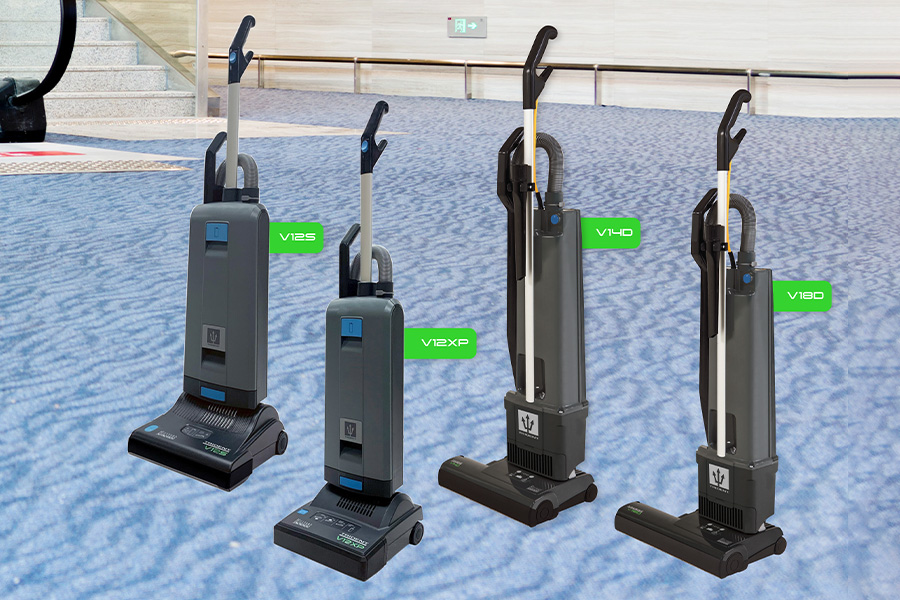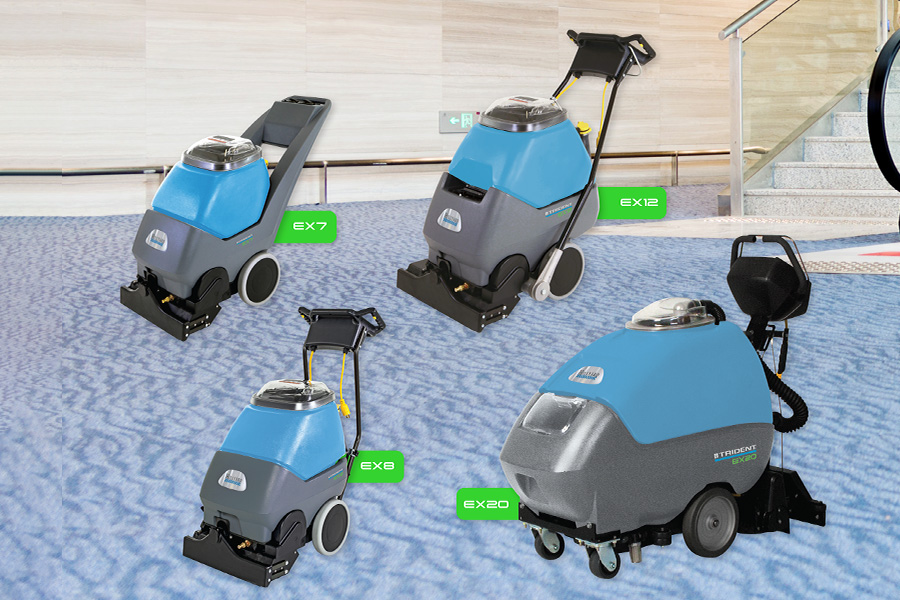Summer Renovation Season: Carpet Renovation 2024 Update
The best carpet care programs prioritize regular maintenance and cleaning throughout the year to keep carpets looking fresh and prolong their lifespan. In addition to routine vacuuming and spot-treating stains, as they occur, a deep cleaning restoration process should be incorporated into the carpet care routine annually.

This deep cleaning process involves using a carpet cleaning machine that can effectively extract dirt, grime, and allergens from the carpet fibers. With Hillyard's help, professional carpet cleaners have access to powerful equipment and specialized cleaning solutions that can thoroughly clean and restore the carpet to its original condition. In this article, we'll cover all the best practices for carpet care, including deep-cleaning restoration.
Carpet Care Best Practices
The key to keeping carpets looking their best is approaching carpet care with a specific strategy. Carpet care can be broken down into five maintenance best practices, and Hillyard can help you excel at each.
Best Practice #1: Prevent soil from entering the building with an effective entry mat program.
Entry mats are a crucial tool in maintaining the cleanliness of your carpet. Not only do they prevent dirt and debris from being tracked into your home, but they also help to protect the carpet fibers from wear and tear. With Hillyard's Gator Matting line, you can find high-quality entry mats designed to effectively capture and trap dirt before it reaches your carpet.
See this article for best practice entry mat maintenance: Entry Matting: Trapping dirt to lower the total cost to clean
By consulting with a Hillyard Account Manager, you can receive personalized suggestions for the most suitable entry matting choices for your particular facility. Quality entry mats are a straightforward yet efficient method to maintain the cleanliness of your carpet and extend its durability.
Best Practice #2: Vacuum carpet daily, including entry matting.
It is important to vacuum high and moderate-traffic areas, such as entry mats, on a daily basis. This prevents soils from becoming embedded in the carpet fibers, which can lead to damage. In addition to removing soil, daily vacuuming also eliminates dust and allergens from the environment, ultimately improving indoor air quality and creating a healthier and more comfortable space for occupants.
Product Spotlight: Trident Commercial Upright Vacuums

For effective daily vacuuming, use Hillyard's Trident Commercial Upright Vacuums. These vacuums feature powerful suction and innovative design elements specifically tailored for commercial carpet care. With adjustable brush heights, a wand for hard-to-reach areas, and a HEPA filtration system, Trident vacuums can ensure thorough and efficient cleaning.
Best Practice #3: Treat spots and stains promptly to avoid permanent damage.
By addressing carpet spots quickly, facility managers reduce the likelihood of the spot becoming a permanent stain. Two techniques are available to cleaning crews: spot extraction and encapsulation.
Spot Extraction
For effective spot extraction, the best practice is a combination of cleaning solution, technique and carpet cleaning equipment. Spot extractors, like the MS2 Spotter Extractor, are lightweight and make extraction easy. As an added benefit, the MS2 Mini-Spotter is also capable of cleaning upholstery.
Encapsulation Spot Treatment
Hillyard’s Double Down® is a system that combines the power of hydrogen peroxide with polymer encapsulation to treat spots without extraction. The peroxide excels at brightening and deodorizing carpets. It reacts with soils to break them down without leaving a residue like traditional carpet surfactants. The polymer technology in Double Down encapsulates the remaining soil residue. After the polymer quickly dries to a non-tacky, crystal powder, vacuuming thoroughly removes it from the carpet.
With the right techniques and chemistry, you can remove a vast array of carpet spots. For a complete spot removal guide that covers over 40 different stains, see this article: The Ultimate Guide to Carpet Spot and Stain Removal.
Best Practice #4: Low Moisture Interim Cleaning
Low Moisture Interim Cleaning, an often-overlooked part step in carpet maintenance, is the key to keeping facilities looking great between restorative extractions. Hillyard Deep Action® for carpet encapsulation is specially formulated to encapsulate dirt, spots, and stains. After the application of Double Down and mechanical agitation into the carpet fibers, the carpet will dry in about 20 minutes. Vacuum the carpet after drying to remove the encapsulated soil.
Hillyard offers two best-practice machines for interim cleaning, the Trident FMD20 Orbital Floor Machine, and the ICS 17 Interim Cleaning System. The Trident FMD 20 is a versatile machine for hard floor maintenance and bonnet encapsulation carpet cleaning. The ICS 17 has two counter-rotating cylindrical brushes that lift and groom the pile during interim cleaning. Your Hillyard Account Manager can help you decide which one is the best for your facility.
For a complete guide to Interim Carpet Cleaning, see this article: Encapsulation Carpet Cleaning: A low-moisture interim cleaning process 2024 Update
VIDEO: HOW TO INTERIM CLEAN CARPET USING ENCAPSULATION
Best Practice #5: Restorative Extraction Cleaning

For educational facilities, the summer break is a good time for a deep cleaning carpet restoration. Restorative carpet extraction cleans deep down to the base of the carpet. This deep-cleaning process helps extract soils missed by vacuuming and interim cleaning methods. Two best practice methods for cleaning crews are the In-The-Tank method and the Pre-spray method.
With the In-The-Tank method, the custodian uses a cleaning solution, like Hillyard HD Extraction Cleaner diluted per the instructions on the bottle, directly in the carpet extractor’s solution tank. This method extracts the solution almost immediately. The “In-The-Tank” process produces good results. However, the Pre-Spray method is even better.
To perform the Pre-Spray method, the custodian sprays the carpet with Hillyard Carpet Pre-Spray solution. After allowing the Carpet Pre-Spray solution to dwell for five minutes, the custodian extracts the carpet with Extraction pH Rinse in the solution tank, diluted per the bottle’s instructions.
Method #1 - The In-The-Tank Method
Step 1: Prepare the area
Remove any furniture, matting, or other obstacles from the area. Place wet floor signs at all hard-floor to carpet transition areas.
Step 2: Vacuum the area
Thoroughly vacuum the area and remove anything stuck to the carpet. As you vacuum, inspect for stains that can be treated before the restorative extraction.
Step 3: Treat any stains found while vacuuming
Remove the stains before continuing, see Best Practice #3. Note that stain removal procedures involve blotting and working to minimize the spread of the stain. It is best to remove stains now because the restorative extraction process my cause the stain to spread, causing a larger issue later.
Step 4: Prepare the carpet extraction equipment
Fill the carpet extractor's solution tank with water. Add Hillyard HD Extraction cleaning solution at a rate of 2 ounces per gallon of water. For enhanced results, add one scoop of Hillyard Carpet Booster per gallon of water. Add four to six ounces of Hillyard Defoamer II to the recovery tank. See this article for more advice on dealing with foam: How to Prevent Foaming During Carpet Extraction. Finally, check that the extractor brush is set to the proper height.
Step 5: Extract the carpet
Run the carpet extractor, spraying the solution and recovering it from the carpet. Use a 25 to 50 percent overlap to prevent streaking.
Step 6: Dry the carpet
Use carpet drying fans to dry the carpet. Carpet that remains wet for longer than 24 hours can start to mildew.
Method #2 - The Pre-Spray Method (Hillyard's Preferred Method)
Step 1: Prepare the area
Remove any furniture, matting, or other obstacles from the area. Place wet floor signs at all hard-floor to carpet transition areas.
Step 2: Vacuum the area
Thoroughly vacuum the area and remove anything stuck to the carpet. As you vacuum, inspect for stains that can be treated before the restorative extraction.
Step 3: Treat any stains found while vacuuming
Remove the stains before continuing, see Best Practice #3. Note that stain removal procedures involve blotting and working to minimize the spread of the stain. It is best to remove stains now because the restorative extraction process my cause the stain to spread, causing a larger issue later.
Step 4: Prepare the carpet extraction equipment
Fill the carpet extractor's solution tank with water. Add Hillyard Extraction pH Rinse or Arsenal Carpet pH Rinse cleaning solution at a rate of 2 ounces per gallon of water. Add four to six ounces of Hillyard Defoamer II to the recovery tank. See this article for more advice on dealing with foam: How to Prevent Foaming During Carpet Extraction. Finally, check that the extractor brush is set to the proper height.
Step 5: Pre-spray the carpet and allow the solution to dwell
Spray Hillyard Carpet Pre-Spray at a rate of 600 to 1,000 square feet per diluted gallon. For large areas, we recommend using the CC17 Cleaning Companion to pre-spray the carpet. For small areas, a pump up sprayer will suffice. Allow the solution to dwell on the carpet for three to five minutes.
Step 6: Extract the carpet
Run the carpet extractor, spraying the pH Rinse solution and recovering it from the carpet. Use a 25 to 50 percent overlap to prevent streaking.
Step 7: Dry the carpet
Use carpet drying fans to dry the carpet. Carpet that remains wet for longer than 24 hours can start to mildew.
VIDEO: HOW TO EXTRACT CARPET
Get the Best Products and the Best Advice from Hillyard
Maintaining and revitalizing your carpets requires expertise and quality products, and Hillyard is here to assist you every step of the way. With a team of experts located across the United States, we can provide personalized guidance and support to tailor a carpet care program that meets your specific needs and challenges.
Whether you're looking to enhance your daily maintenance routine, address stubborn stains, or schedule a deep cleaning restoration, our knowledgeable representatives are ready to assist you. By leveraging our extensive experience and comprehensive product range, you can achieve exceptional results and prolong the lifespan of your carpets.
If you're interested in learning more about how Hillyard can elevate your carpet care program, simply fill out the "I'm Interested" form below, and one of our representatives will promptly reach out to discuss your requirements and provide customized solutions.